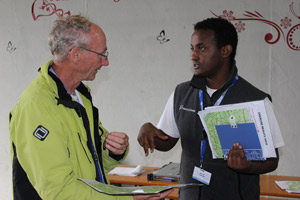
Meet...Zerom Tesfay, Mercy Corps
Regional IT System Administrator for Africa
It's a rare and valuable thing when someone gets to pursue their passion as their life's work. But for Zerom Tesfay, Mercy Corp's Regional IT System Administrator for Africa, his vocation was never in question.
"Computers have been my passion since childhood," he says. "I love playing with them. I started working with computers at home, and then finally won a place at the University of Sunderland to study Computing."

It's been quite a journey since his youthful tinkering. Zerom now supervises ICT operations in 15 countries across Africa for Mercy Corps. He joined the organization straight out of school in 2001, when he "started getting passionate about humanitarian work, going to the field and working with beneficiaries."
Apart from a year working with the United Nations Mission in Ethiopia and Eritrea (UNMEE), Zerom has worked with Mercy Corps all his life, relocating to Sudan in 2007; a challenging, but "very rewarding" experience.
"It was one of the most stressful environments I've worked in," says Zerom of his time in Sudan. "I was based in Juba covering the whole of Sudan: Darfur, Khartoum, South Sudan and the transitional region, all the volatile and complex areas. There was war, insecurity, bad weather and a lack of resources. We had to import computers from Nairobi."
But one man's problem is another man's opportunity.
"I installed 20 VSATs across the country so that all offices were able to communicate and send reports to donors. Before that they had to wait for flights to come in before taking reports out. Now they send emails, use Skype, video conference…"
Perhaps his most gratifying assignment was training 12 ICT officers whose sole qualification was that they knew what a keyboard looked like. But in three years they have learnt how to "install VSATs and provide ICT training to the community. One of them is working for the United Nations Refugee Agency (UNHCR), the others for NGOs. They call me and tell me how well they are doing," says Zerom. "It's great seeing them with that level of confidence."
His experience in Sudan, and what is now South Sudan, was ideal preparation for his current role in which "drought, conflict and wars" are something he has to contend with on a regular basis. "It's a learning curve," he says. "I really like it. It's risky, but I'm learning management skills, how to allocate resources in conflict areas, preparedness and learning to work with what you have."
In such a volatile region technology will play a key part in improving humanitarian operations in the future believes Zerom. "ICT is really evolving," he says. "In some countries, rebel groups have taken our computers and we didn't have backup. Now we have the cloud. Mobile devices can upload assessments in the field and send early warning messages. I'm hoping tech will solve a lot of issues in the humanitarian context."
It's something he wants to focus on in the future, particularly IT security. He may even continue his studies. Whatever he does he'll "stay in the humanitarian sector. I believe I'm born to work in the humanitarian context. I really like to see change, to help people so we have a better environment for the future."